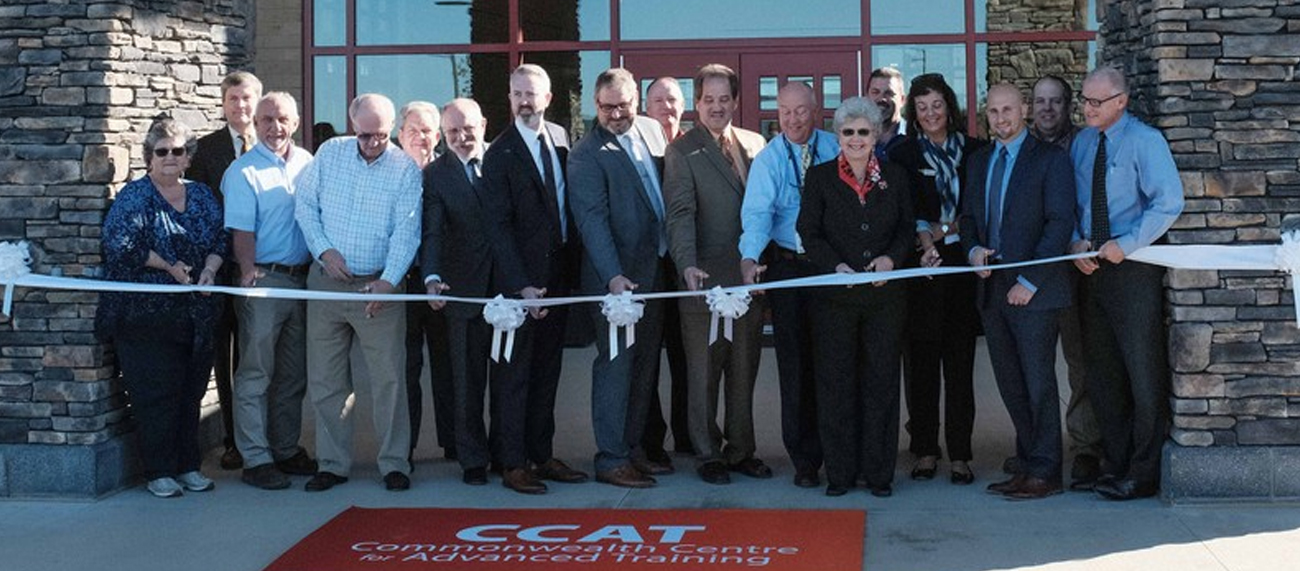Pictured above: Local officials and guests cut the ribbon to open the Commonwealth Centre for Advanced Training (CCAT).
The Commonwealth Centre for Advanced Training (CCAT) has been put to use before it officially opened.
The official opening, complete with a ribbon cutting, was held Wednesday. About 100 people listened to speeches and toured the building that will enable companies in the Commonwealth Crossing Business Centre (CCBC) to get a head start on hiring and training employees before their facilities open.
However, Commonwealth Crossing’s first industry, Press Glass of Poland, got a head start at the CCAT. It hosted about 400 people at meet and greet events there in September, and it is using the facility now for interviewing, training and other purposes.
When Press Glass’s new 280,000-square-foot building is completed and the company opens in March or April of 2020, it will leave the training center and the next industry to locate in the Commonwealth Crossing Business Centre (CCBC) will be able to move in.
“CCAT has accomplished the elusive goal” of fulfilling its mission on day one with Press Glass’s use of the building, said Mark Heath, president/CEO of the Martinsville-Henry County Economic Development Corp. (EDC).
‘We’re just getting started. The best is yet to come,” Jim Adams, chairman of the Henry County Board of Supervisors, told those gathered in the CCAT’s high bay training area for the event.
Adams and other speakers praised the training center as an innovative tool designed to encourage companies to locate in the CCBC south of Martinsville. As people toured the building, Heath said he doesn’t know of a similar facility in this area.
The 25,500-square-foot, $6.5 million building features advanced manufacturing training facilities as well as office space that companies locating in the business center can use for pre-employment services, training on their own equipment and other work while their facilities are being built.
During tours of the building Wednesday, visitors entered the lobby where an architectural feature hangs from the ceiling. It was designed by the firm of RRMM of Roanoke to create a modern, architectural feel to the building, Heath said.
Visitors going to the left of the front door entered an open breakout area with tables and chairs positioned at the wall of glass that spans the front of that side of the building. Behind that is a training room with a large video screen and a conference room with a long meeting table featuring a cantilever base and glass top, all made in the United States.
To the right of the front door is a reception area. Behind that are a kitchen, offices, break room and other facilities.
Off that wing is one of the unexpected showstoppers of the building — an outdoor patio area with a fireplace set in a stone wall and casual seating. On Wednesday, it was used for media interviews.
Across the entire back of the building is the 15,336-square-foot high bay training space where industries can place advanced manufacturing equipment for training purposes. The equipment will be removed once a company is ready to move into its own building at CCBC.
“Finally,” said Harvest Foundation President Allyson Rothrock as she glanced around the patio during the tour.
Harvest has been a long-time supporter of Commonwealth Crossing Business Center. Henry County acquired 720 acres along the county’s southern border for the center in 2007 but a battle with the U.S. Army Corps of Engineers over an environmental permit for the project put it on hold for several years.
After extensive negotiations and ultimately help from the area’s congressional delegation and others, the permit finally was granted in 2014 and work on the center began full steam.
When CCBC was declared open for business in 2017, County Administrator Tim Hall estimated that $25 million to $30 million had been spent on its development.
Nearly $6 million of that was in the form of Harvest Foundation grants. Harvest provided $691,862 for a water and sewer infrastructure project and $5 million for grading and infrastructure improvements at Commonwealth Crossing. It also gave a $5 million grant to the EDC for the CCAT facility for a total of $10,691,862 in grants for the business park and training center.
However, Press Glass’s announced $43.55 million investment in its CCBC facility matches the funds spent to develop the business center, Rothrock noted Wednesday.
She also said Harvest believes that sometimes taking a chance on something different, such as CCAT, can give a community a leg up when competing for economic deals.
She likened the project to a train ride. Everyone wants to be on the train but not everyone wants to build the track, she said as a train rumbled by the business center.
“It was a fabulous investment,” Rothrock added.
Heath stressed that CCAT was a team effort, and he thanked most if not all of the partners in the project. They included officials in Martinsville; Henry County; Patrick Henry Community College, which will tailor training programs in CCAT for the industries using it; private businesses; agencies; and others.
Some of those partners helped the EDC take advantage of a complicated financing tool called New Market Tax Credits and other sources to turn Harvest’s $5 million grant for CCAT into $13 million for the building, water tank and sewer project.
Heath said Wednesday that would not have happened if it had not been for the Harvest grant, the tax credits and the assistance of bankers, advisors and others.
Two of those involved with the tax credits spoke at Wednesday’s event. Bryan Phipps, vice president for development of People Inc. in Abingdon, briefly described his company’s role with the credits and the stiff competition for the funding. He added that he was impressed by the level of community support for the Henry County project.
Also, Chris Sears, senior vice president and SBIC investor director of SunTrust Community Capital, said the CCAT stood out from other projects because of the vision and teamwork behind it. CCAT fit SunTrust’s mission to promote education and be a catalyst for job creation, he said.
Sears originally is from Danville and then lived in Roanoke and frequently visited relatives in Martinsville-Henry County. “It was important to me to see this across the finish line,” he added.



